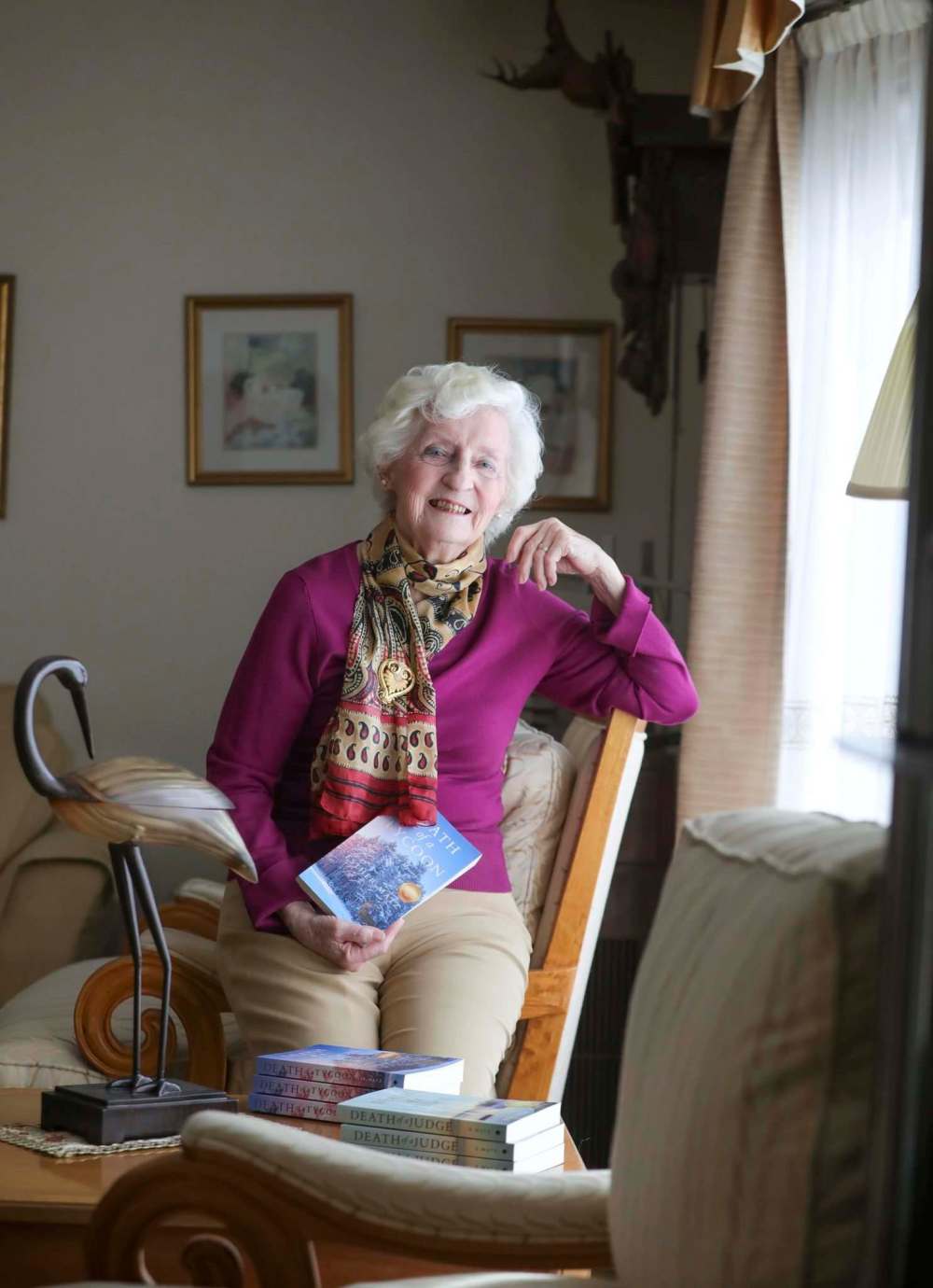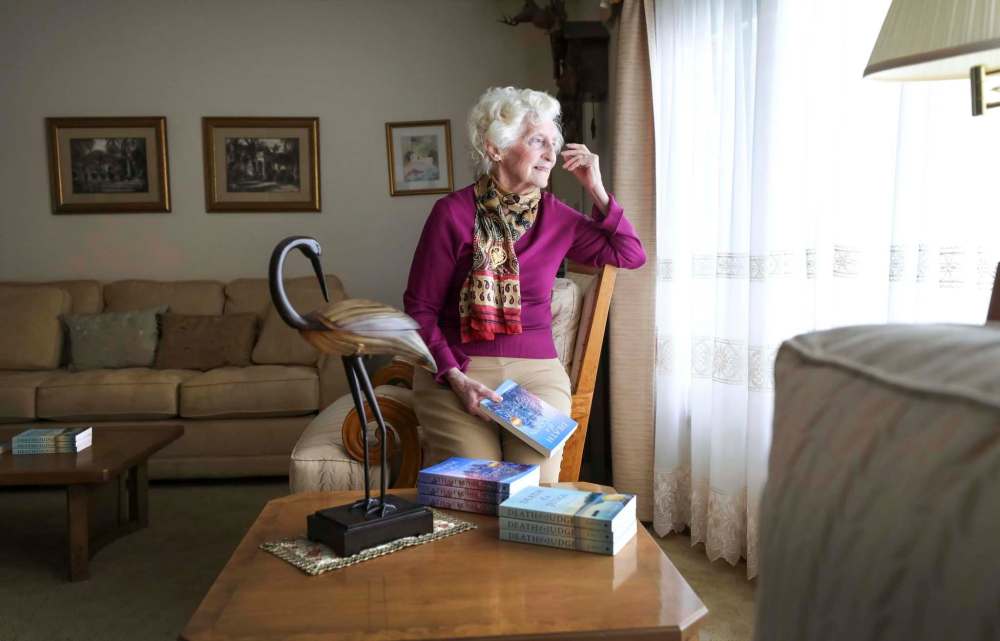The plot thickens Rather than retiring after a long law career, Esther Matz threw herself into a life of crime... writing
Read this article for free:
or
Already have an account? Log in here »
To continue reading, please subscribe:
Monthly Digital Subscription
$0 for the first 4 weeks*
- Enjoy unlimited reading on winnipegfreepress.com
- Read the E-Edition, our digital replica newspaper
- Access News Break, our award-winning app
- Play interactive puzzles
*No charge for 4 weeks then price increases to the regular rate of $19.00 plus GST every four weeks. Offer available to new and qualified returning subscribers only. Cancel any time.
Monthly Digital Subscription
$4.75/week*
- Enjoy unlimited reading on winnipegfreepress.com
- Read the E-Edition, our digital replica newspaper
- Access News Break, our award-winning app
- Play interactive puzzles
*Billed as $19 plus GST every four weeks. Cancel any time.
To continue reading, please subscribe:
Add Free Press access to your Brandon Sun subscription for only an additional
$1 for the first 4 weeks*
*Your next subscription payment will increase by $1.00 and you will be charged $16.99 plus GST for four weeks. After four weeks, your payment will increase to $23.99 plus GST every four weeks.
Read unlimited articles for free today:
or
Already have an account? Log in here »
Hey there, time traveller!
This article was published 05/03/2021 (1739 days ago), so information in it may no longer be current.
Vivian sat in her Jetta, shivering uncontrollably.
The opening line of Esther Matz’s first book occupied her mind and an otherwise blank Word document on her computer named “Novel” for three long years — an intriguing scene begging to be explained and expanded.
Matz had wanted to write a novel for as long as she could remember, but work and family always took precedence. Retirement seemed like a golden opportunity and she started mulling Vivian’s story and the aforementioned sentence in 2015, shortly after closing her Winnipeg law practice at the age of 76.
Still, between volunteering at church and helping out with the family business, Matz found she had little time to write. 
“I was still busy,” she says. “It’s a total-immersion, full-time job to write well, as far as I’m concerned.”
But Esther Matz isn’t the type to leave a goal unmet. She finally put pen to paper two years ago and today, at 82 years old, she’s written two full-length novels with a third on the way.
Her Pineview Mystery series is a self-published crime and romance saga following a young lawyer, Vivian Clarke, and an RCMP detective, Bruce Hathaway, as they work their way through a string of mysterious murders in small-town Canada.
The first two books, Death of a Judge and Death of a Tycoon, have landed on the shelves at McNally Robinson and found readership at home and in the United Kingdom.
“It’s a total-immersion, full-time job to write well, as far as I’m concerned.” – Esther Matz, novelist
The setting for the series is inspired by her family cottage on the Lee River in eastern Manitoba and the subject matter is heavily informed by Matz’s 35-year career as a civil and municipal lawyer.
“When I practised law, I could read cases for hours; each case to me was a mini-story and I thought of the people involved and how it would work out, but my concentration had to be focused on the legal aspect,” she says. “Now, when I write a novel I come in from the other side; I’m writing about people and their encounters in legal situations and how they handle them.”
Author is Matz’s third job title. So far.
The middle child of five siblings, she grew up in a large Mennonite family on a farm near Altona, a town located 100 kilometres south of Winnipeg. Her parents spoke Low German at home and she was introduced to English in the one-room schoolhouse she attended until Grade 9. Tenacity and academic success were highly regarded on the homestead.
“We were encouraged to work hard and do our best… our parents wouldn’t allow us to fail,” she says. “And we did very well, but the pressure was there that we didn’t fail.”

Matz was a bright student and had to be held back several years in high school so she would be old enough to attend teacher’s college — a long-standing dream — upon graduation. She taught music locally for two years before moving to Kansas to study at a liberal arts college, where she was encouraged by a professor to explore her love of creative writing.
Back in Winnipeg, she returned to teaching, got married and started a family. Matz had been working in the school system for 15 years when she applied to law school to assist with her husband’s business. “We decided one of us should learn the law,” she says. “I wasn’t even going to article. I was just going to learn the law.”
She passed the LSAT on her first attempt and did indeed complete her law degree — graduating with a doctorate, in fact. She started a private practice in her home to be closer to her two young daughters.
While some lawyers enjoy battling in the courtroom, Matz preferred to be holed up at her desk under a mountain of case files and paperwork.
‘There’s a lot of office work involved and I love office work,” she says with a laugh. “I could be in the office day and night.”
Her home office is still her happy place, although these days she’s busy working on cases of an entirely different nature. Sitting in the light-filled study of her Fort Richmond home, Matz writes 1,500 words a day, four days a week. It’s a strict schedule that allows her to get inside her characters’ heads and turn out a book a year.

The plots of the Pineview novels are just as much a mystery to the writer as they are to the reader. Matz starts each one with a simple opening line and a crime, working backwards to figure out how the act was committed. It’s a process that satisfies her fondness for problem-solving — when she’s not writing she’s doing crosswords and jigsaw puzzles.
“I don’t know the ending until I’m about two-thirds to three-quarters into the book, then I decide, OK, I’ve collected enough evidence on this crime,” Matz says. “My family calls me a master criminal.”
Her family is also majorly proud of her.
Death of a Judge started off as a mother-daughter project with her eldest, Einike Posner, who lives in California. The plan was to write a chapter each until they had a finished book.
“She would write 12 pages and then I would write one and then she would write 30,” Posner says, laughing. “And then it was, ‘OK, I’m tapping out.’”
“My family calls me a master criminal.” – Esther Matz, novelist
The collaboration turned into weekly phone calls to discuss plot points and brainstorm ideas if Matz was feeling stuck.
Posner isn’t surprised in the least that her mother has become a novelist in her 80s: “She’s very disciplined and very in-tune with what she knows and what she wants to do and what she can do.”
Natalie Landgraff shares her sister’s sentiments. Before publishing her own work, Matz was an avid reader — Agatha Christie, P.D. James and Charles Dickens are favourites — who fostered a love of literature among her children. Landgraff has fond memories of receiving books, such as Bridge to Terabithia, as gifts on holidays and has enjoyed reading her mother’s work.
“I couldn’t be prouder, I think it’s a wonderful way to show your life experiences, because there’s a lot of her in those novels,” she says. “She has a lot to offer the world in terms of her thoughts, ideas, feelings and opinions.”
The project has both daughters thinking about their own bucket lists.
“It is inspiring; it makes me think what is possible for me,” Landgraff says.
For Matz, writing is the realization of a long-held dream and a delightfully self-indulgent activity.
“It has been very, very, very fulfilling,” she says. “There’s some hard work involved, but you know, there’s an old saying, ‘What’s written without effort is written without pleasure.’ I just enjoy it a lot.”
The process is only bested by the moment she received a printed copy of her novel for the first time.
“There’s some hard work involved, but you know, there’s an old saying, ‘What’s written without effort is written without pleasure.’ I just enjoy it a lot.” – Esther Matz on writing
“When I saw the Purolator truck drive up, I was out of my mind,” she says, her voice filling with giddiness. “The completion of a book is completely, totally, out-of-this-world satisfying.”
Asked if she has any advice for would-be writers, Matz says, “If you want to write you’ve got to live, you’ve got to have experiences, but also read a lot; other authors are such a tremendous inspiration.”
eva.wasney@freepress.mb.ca
Twitter: @evawasney

Our newsroom depends on a growing audience of readers to power our journalism. If you are not a paid reader, please consider becoming a subscriber.
Our newsroom depends on its audience of readers to power our journalism. Thank you for your support.










